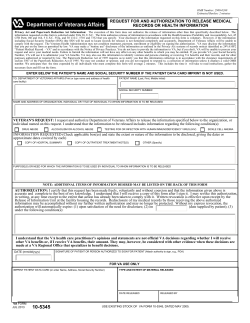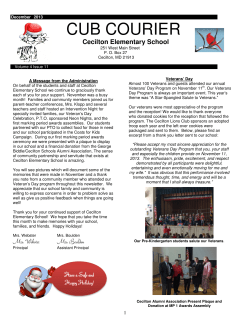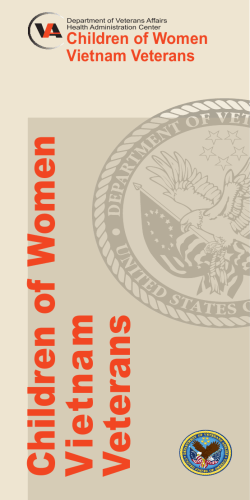
VA Resources for Veterans and Families
Making a Difference in Oregon City, OR OCTOBER 2014 IN THIS ISSUE: VA Resources for Veterans and Families Reprinted from Guide to Mental Health Services for Veterans & Families The Veteran’s Health Administration (VHA) provides mental health services at its medical centers and community-based outpatient clinics. In addition, readjustment counseling services are available for Veterans and their Families at Vet Centers across the nation. For more information, visit the VA Mental Health website at www.mentalhealth.va.gov or the Vet Center website at www.vetcenter.va.gov. Make the Connection (www.maketheconnection.net) is a public awareness campaign by the department of Veteran Affairs that provides personal testimonials and resources to help Veterans and their Families and friends learn from each other’s experiences and discover ways to improve their lives. Veterans Crisis Line connects Veterans in crisis and their Families and friends with qualified, caring Department of Veterans Affairs responders through a confidential toll -free hotline, online chat, or text. Veterans and their loved ones can call (800) 273-8255 and Press 1, chat online at www.veteranscrisisline.net, or send a text to 838255 to receive confidential support 24/7, 365 days a year. Coaching into Care is a free and confidential coaching service to help callers discover new ways to talk with a veteran about their concerns and treatment options. VA works with Family Members or friends who become aware of a Veterans’ postdeployment difficulties, and supports their efforts to find help for the Veteran. Callers can reach the service at 888-823-7458. More information can be found at www.mirecc.va.gov/coaching. VA Resources for Veterans and Families ..........1 Vietnam 25th Infantry Div 1st Cavalry Meeting .....2 American Women Veterans Assoc Meeting ......2 Douglas County Veterans Forum .....................2 Portland Veteran Job Fair ...............................2 10th Mountain Div Group Meeting ..................2 Think It’s E—Z ................................................3 Breast Cancer Awareness Month ....................3 Spouse Education & Career Opportunities ......3 National Cyber Security Awareness Month.......4 Domestic Violence Awareness Month..............5 11 Ways to Save When You’re Broke ...............6 ARMY STRONG COMMUNITY CENTER Clackamas Community College, CC140 19600 Molalla Ave Oregon City, OR 97045 KYLE BELL Contract Customer Support Coordinator Office: 503-594-6215 [email protected] ANNIE CRAWFORD Contract Customer Support Coordinator Office: 503-594-6215 [email protected] OFFICE HOURS Monday—Friday, 8am—5pm Closed Monday, October 13 National Center for PTSD is VA’s center of excellence for research and education on the prevention, understanding, and treatment of PTSD. The mission of the National Center is to advance the clinical care and social welfare of America’s Veterans through research, education, and training in the science, diagnosis, and treatment of PTSD and stress-related disorders. For more information, visit www.ptsd.va.gov. For more information, contact the ASCC. The information presented in this newsletter is for informational awareness only and does not represent endorsement, sponsorship, recommendation, or promotion of any commercial event(s), commercial names or brands by the editors of this Newsletter, the Department of Defense, US Army, US Navy, US Air Force, US Coast Guard, National Guard or Reserve, and the federal government. Usage of commercial or trade mark names is for identification purposes only. OREGON CITY ARMY STRONG COMMUNITY CENTER NEWSLETTER | OCTOBER 2014 | PAGE 1 Vietnam 25th Infantry Division, 1st Cavalry Veterans Meeting Sunday, October 12, 2014| 12:00 PM Superking Buffet 5015 SE 82nd Avenue | Portland, OR 97266 All Veterans are welcome to meet for lunch and conversation on the 2nd Tuesday of each month. For more information, contact Gary Hartt at (503) 632-6955 or Terry Low at (503) 210-5558. American Women Veterans Association Monthly Meeting Portland Veteran Job Fair Tuesday, October 23, 2014 | 11:00 AM – 3:00 PM The Atrium at Montgomery Park 2701 NW Vaughn Street, #210 Portland, OR 97210 Recruit Military is hosting a veteran’s job fair in October free for military members and spouses to find jobs and or learn about employment and education programs for veterans in the Portland area. If interested please register online at the address below. For more information, visit events.recruitmilitary.com/ events/portland-veteran-job-fair-october-232014#registration. Tuesday, October 14th, 2014 | 5:00 PM The American Legion, Post 16 406 SE Oak Avenue | Roseburg, OR 97470 Meet with other Female Veterans from all US service branches/eras every 2nd Tuesday of each month to become better informed, get involved with service projects, and enjoy camaraderie. For more information, contact Dona Brewer at (541) 391-9813. Douglas County Veterans Monthly Forum 10th Mountain Division Group Monthly Meeting Tuesday, October 21, 2014 | 5:00 PM Roseburg American Legion Post 16 406 SE Oak Street | Roseburg, OR 97470 Sunday, October 26th, 2014 | 1:00 PM Eastmoreland Golf Course Club House 2425 SE Bybee Blvd | Portland, OR 97202 Veteran organization leaders discuss and develop common support issues for all veterans in SW Oregon. Briefings from VA Roseburg Healthcare Systems, county veteran service officer and veteran's agencies. Meetings are held on the third Tuesday of each month. Newcomers, WWII comrades and descendants are invited to lunch. They conduct group planning for the 10th Mountain Memorial Grove, picnics and other events. The group meets on the last Sunday of each month. For more information, contact John McDonald at (541) 580-6178 or [email protected]. For more information, contact Jim Bray at (503) 913-7058. OREGON CITY ARMY STRONG COMMUNITY CENTER NEWSLETTER | OCTOBER 2014 | PAGE 2 Think It’s E-Z? Love breezing through tollbooths with your E-Z Pass? A new scam is taking advantage of that. Here’s how it works: You get an email that appears to be from E-Z Pass. It has the E-Z Pass logo, and says you owe money for driving on a toll road. It also provides a link to click for your invoice. Guess what? The email isn’t from E-Z Pass. If you click on the link, the crooks running this scam may put malware on your machine. And if you respond to the email with your personal information, they’re likely to steal your identity. This E-Z Pass email is the latest in a long line of phishing scams, where fraudsters pretend to be legitimate businesses as a way to get access to people’s personal information. But adopting a few online security habits can help you avoid phishing scams: Never click on links in emails unless you’re sure who sent you the message. Don’t respond to any emails that ask for personal or financial information. Email isn’t a secure way to send that information. Type an organization’s URL yourself, and don’t send personal or financial information unless the URL begins with https (the “s” stands for secure). If an email looks like it is from E-Z Pass, contact E-Z Pass customer service to confirm that it is really from them. Keep your computer security software current. Have You been tricked by a phishing email? Forward it to [email protected] and to the company impersonated in the email. File a complaint with the Federal Trade Commission at ftc.gov/complaint. Visit the FTC’s Identity Theft website at ftc.gov/idtheft. For more information, visit www.consumer.ftc.gov. Breast Cancer Awareness Month 2014 National Breast Cancer Awareness Month is a chance to raise awareness about the importance of early detection of breast cancer. Make a difference! Spread the word about mammograms and encourage communities, organizations, families, and individuals to get involved. Breast cancer is the second most common kind of cancer in women. About 1 in 8 women born today in the United States will get breast cancer at some point. The good news is that many women can survive breast cancer if it’s found and treated early. A mammogram – the screening test for breast cancer – can help find breast cancer early when it’s easier to treat. If you are a woman age 40 to 49, talk with your doctor about when to start getting mammograms and how often to get them. If you are a woman age 50 to 74, be sure to get a mammogram every 2 years. You may also choose to get them more often. Talk to a doctor about your risk for breast cancer, especially if a close family member of yours had breast or ovarian cancer. Your doctor can help you decide when and how often to get mammograms. For more information, visit healthfinder.gov. Spouse Education and Career Opportunities (SECO) To help military spouses reach their education and career goals as they balance work-life priorities and interests, DoD has established a comprehensive, holistic, spousecentered program called SECO. The program seeks to strengthen the education and career opportunities of military spouses worldwide. For more information, visit www.MilitaryOneSource.mil or call (800) 342-9647. OREGON CITY ARMY STRONG COMMUNITY CENTER NEWSLETTER | OCTOBER 2014 | PAGE 3 National Cyber Security Awareness Month The Internet is part of everyone’s life, every day. We use the Internet at work, home, for enjoyment, and to connect with those close to us. However, being constantly connected brings increased risk of theft, fraud, and abuse. No country, industry, community, or individual is immune to cyber risks. As a nation, we face constant cyber threats against our critical infrastructure and economy. As individuals, cybersecurity risks can threaten our finances, identity, and privacy. Since our way of life depends on critical infrastructure and the digital technology that operates it, cybersecurity is one of our country’s most important national security priorities, and we each have a role to play—cybersecurity is a shared responsibility. National Cyber Security Awareness Month is designed to engage and educate public and private sector partners through events and initiatives with the goal of raising awareness about cybersecurity and increasing the resiliency of the nation in the event of a cyber incident. October 2014 marks the 11th Annual National Cyber Security Awareness Month sponsored by the Department of Homeland Security in cooperation with the National Cyber Security Alliance and the Multi-State Information Sharing and Analysis Center. For tips and resources you can use and share throughout the year, visit the DHS Stop.Think.Connect. Toolkit and find resources for the following demographics: Students K-8, 9-12, and Undergraduate Parents and Educators Young Professionals Older Americans Government Industry Small Business Law Enforcement For more information on how to practice cybersecurity during National Cyber Security Awareness Month and throughout the year, visit Stop.Think.Connect at www.dhs.gov/stopthinkconnect-get-informed. Stop.Think.Connect.TM Tips for keeping your personal information safe, your Family protected, and our nation security intact. STOP STOP hackers from accessing your accounts—set secure passwords. STOP sharing too much information. Keep your personal information personal. STOP—trust your gut. If something doesn’t feel right, stop what you are doing. THINK THINK about the information you want to share before you share it. THINK how your online actions can affect your offline life. THINK before you act—don’t automatically click on links. CONNECT CONNECT over secure networks. CONNECT with people you know. OREGON CITY ARMY STRONG COMMUNITY CENTER NEWSLETTER | OCTOBER 2014 | PAGE 4 Domestic Violence Awareness Month Intimate Partner Violence: Let VA Help Intimate partner violence (IPV), which is often called domestic violence, occurs when a current or former intimate partner (e.g., boyfriend, girlfriend, spouse) harms, threatens to harm, or stalks their partner. While domestic violence does include IPV, it refers to any violence that occurs in the home. Domestic violence includes child abuse, elder abuse, and other forms of interpersonal abuse. IPV refers specifically to violence between intimate partners. IPV can happen to anyone. It can happen no matter your age, income, race, ethnicity, culture, religion, or disability. IPV is prevalent among women Veterans, active duty women, and women living in the U.S. overall. One-third of women Veterans experience IPV in their lifetime compared to less than a quarter of civilian women. Women who have experienced IPV may have short and long-term health effects. They may experience short-term health effects such as physical injuries like stab wounds or broken bones or sexually transmitted infections. They may also experience long-term health effects such as obesity; problems with their heart, stomach, or digestive systems; difficulties with pregnancy or unwanted pregnancies; chronic pain; and other stress-related difficulties such as headaches. They may also experience mental health issues such as depression, substance abuse, posttraumatic stress disorder, and thoughts of hurting themselves. Has your partner: Emotionally mistreated you (e.g., called you names, tried to embarrass, or intimidate you)? Tried to control where you go, who you talk to, what you can wear, or what you can do? Told you that you are “crazy” or “worthless"? Stolen or tried to control your money? Looked at you or acted in ways that scare you? Threatened you, your possessions, your pets, or loved ones? Physically hurt you or tried to hurt you? Forced you to engage in sexual activities? Threatened to commit suicide or kill you if you left them? If you answer yes to any of the questions above or identify with any of the behaviors detailed above, VA can help. Some people experience only one of these forms of violence while others may experience more than one. IPV can be a single event or can last for many years. No matter what, no one deserves to be treated this way. Resources If you are in immediate danger, call 9-1-1. Contact the National Domestic Hotline at 1-800-799- SAFE (7233) or on the web at www.thehotline.org for 24-hour confidential support, local referrals, safety planning, housing options, and legal resources. Contact your local VA hospital and ask to speak with the Women Veterans Program Manager. Develop a safety plan. VA employees who are impacted by IPV can contact their Employee Assistance Program or visit it on the web at www.opm.gov/policy-data-oversight/worklife/employee-assistance-programs/. Talk to your primary care provider, who can refer you to a specialist if needed. Check out Futures Without Violence at www.futureswithoutviolence.org to learn about educational programs designed to end violence against women. An IPV Webinar training conference is scheduled for October 9. For information on how to attend, visit conferences.bwjp.org/webconferencedetail.aspx?confid=350. OREGON CITY ARMY STRONG COMMUNITY CENTER NEWSLETTER | OCTOBER 2014 | PAGE 5 11 Ways to Save When You're Broke We always want what we don't have, and for most Americans it's a full savings account. The national saving rate was less than .5 percent in 2013 but most Americans still choose to live beyond their means, until they have nothing to live on. So if you're ready to tighten the purse strings, the Illinois CPA Society developed 11 ways to help you save during tough times: 1.) Avoid Paying Fees. 2.) Take advantage of sales and use coupons. 3.) Shop around and compare prices. 4.) Evaluate your cable/satellite TV package. 5.) Eliminate magazine subscriptions or reduce the amount of magazines you receive. 6.) Calculate the cost of your commute. 7.) Scale back on the vacation. 8.) Alter your attitude about saving. 9.) Experiment with less expensive products and places. 10.) Eat meals at home and prepare a lunch to take to work. 11.) Change the 'need it now' mentality. If you follow these steps and save money on the little expenses you could prepare yourself for any big financial emergencies that could arise. Additional Resources Military Saves is a campaign coordinated by the nonprofit Consumer Federation of America (CFA) and is dedicated to helping servicemembers and their families save money, reduce debt, and build wealth. militarysaves.org Thrift Savings Plan (TSP) is a Federal Government-sponsored retirement savings and investment plan. It offers the same type of savings and tax benefits that many private corporations offer their employees under "401(k)" plans. www.tsp.gov Choose to Save® national public education and outreach program is dedicated to raising awareness about the need to plan and save for long-term personal financial security. www.choosetosave.org Consumer Federation of America (CFA) is an association of non-profit consumer organizations that was established to advance the consumer interest through research, advocacy, and education. www.consumerfed.org Investor.gov is an online resource to help invest wisely and avoid fraud. www.investor.gov MyMoney.gov is a product to strengthen financial capability and increase access to financial services for all Americans. www.mymoney.gov/Pages/default.aspx Federal Trade Commission (FTC) works to prevent fraudulent, deceptive and unfair business practices in the marketplace and to provide information to help consumers spot, stop and avoid them. www.consumer.ftc.gov OREGON CITY ARMY STRONG COMMUNITY CENTER NEWSLETTER | OCTOBER 2014 | PAGE 6
© Copyright 2026











